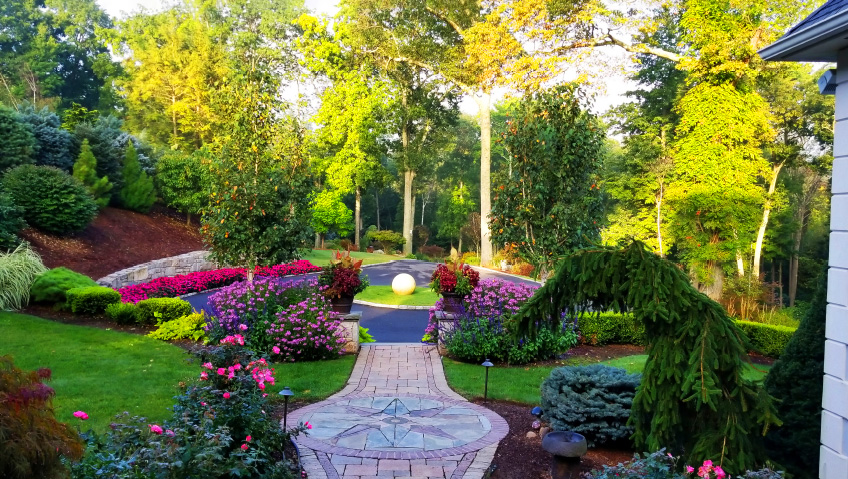Winterberry Gardens has a goal: to be the number one regional landscaper in New England. The Southington, Connecticut-based company is well on its way to achieving this, despite humble beginnings. After growing steadily and adding divisions along the way, the business has become a one-stop shop for all landscaping needs, integrating services into a single, streamlined experience.
Winterberry Gardens boasts a sixteen-acre Garden Center filled with a wide range of unusual specimens and hardy native plants. A staff of landscape designers can deliver a one-of-a-kind plan that is both functional and visually appealing in order to fit each customer’s individual taste, budget, and space. Irrigation and lighting specialists create systems that are as stylish as they are easy to maintain, while fully equipped and experienced landscape maintenance crews keep customers’ outdoor spaces in tiptop shape through all four New England seasons.
“[When] We take on a client’s property, we can take on everything from installing the outdoor kitchen and custom design work around their pool, to their daily maintenance, starting up their irrigation system, fertilizing their property, and then maintaining it for years to come,” explains CEO Bryan Stolz. “Whether they are residential or commercial, we can take on all the aspects of managing their outdoor space.”
From large commercial construction projects and big golf course irrigation jobs all the way down to residential design, “we really run the gamut,” says Stolz. “Our clients can be anything from a walk-in client who wants to purchase a houseplant all the way up to a commercial General Contractor who needs a million-dollar plus construction project completed.” This diversity of clients necessitates “very different customer experiences, very different customer journeys.”
An additional, highly specialized area the company works in is national cemeteries, which requires yet another skillset. “Those are very difficult projects,” says co-owner Chris Daigle. “You’re dealing with the Veterans Association, the United States Government, and it’s hard to get in. But once you get in, you’re in.” To win and keep federal work, the team has had to become “very good at paperwork” in addition to having the necessary skills and experience.
Winterberry Gardens also boasts a rapidly growing division dedicated solely to golf course irrigation. “We started off saying, ‘okay we’re going to do two golf courses a year in New England,’ and next thing you know we’re being asked to work in Florida and we just finished a job in Nebraska and another project in Texas,” says Daigle. About half of the company’s golf course work is for existing courses, while the remaining half is for new construction.
This breadth of services sets the company apart. “In New England, our industry is very fragmented,” Stolz explains. “There are lots of very small competitors that we go up against. And so by consolidating some of that market, by growing to be a little bit of a larger, more professional organization, that gives us an advantage because we can provide for our clients a much higher level of service, a much more professional experience.”
He adds that landscaping companies do not typically have employees focusing on one specific specialty. “It’s the same people doing everything… But we are organized into independent departments where each of these different services are done by craftsman and professionals.”
Even though services are divided amongst different specialists, clients don’t have to go through multiple people. “We create a system where our clients only have a single point of contact to manage all this,” Stolz says. “So we can really take a lot off of the plates of clients, whether they are residential or commercial, to help make the management of their property a lot easier.”
One factor that unites all of the company’s many divisions is a commitment to quality. “We hold our people to a high standard,” Stolz says. “We hold ourselves to a high standard, and we always try to be that top provider in terms of quality.” This means that the team will hold onto the company culture and values that have always underpinned its success no matter how much Winterberry Gardens expands. “We want to maintain what made us special as we grow,” Stolz says.
Daigle adds, “Really it’s about its values—family values—and that’s what drives us, 100 percent.”
Management credits the company’s skilled and committed employees for the business’ growth and success, and they are eager to give these employees every opportunity to use their talents to the fullest extent. “One of the things that we’re really passionate about here and that we talk about a lot is creating opportunities for our people,” Stolz says. “We have a lot of people who have been here for ten, fifteen, twenty-plus years of that thirty-five [year company history], and the only way you can retain people is by giving them paths to advance themselves and better themselves. And so a lot of the growth that we’ve been able to undertake [in] the last ten years has been driven by our people. We’ve had people come to us with ideas and with new opportunities and we’ve been able to help them execute on that. And by allowing the growth to be driven and guided by the people, it has led to our high-level diversification, which has become an advantage for us in the market.”
Giving employees a career path—and not just a job is—another factor that sets Winterberry Gardens apart. “It’s common that unless you have your name on the side of the truck that there’s not a path for you to make it a career,” Stolz says. “We want to get away from that. So we have lots of people who started out in the field and worked their way up to management, senior level positions. And in order to maintain that growth, to maintain those career paths, then the company has to grow as well. So that’s really what’s driving us to [grow].”
Winterberry Gardens has still faced challenges of course, even in the midst of successful growth. “We are seeing a lot of the same challenges that a lot of other people in our industry are,” Stolz shares. “Our supply chain has been a real challenge the last two years. Inflation has been really challenging, especially on the construction side. When we’re dealing with projects and backlogs that may have been bid under a completely different economic environment than when they’re completed, sometimes you can’t get reimbursed for that difference.”
Hiring enough employees to keep up with the company’s growth has been another concern. “We also experience the labor shortage just like many other people in our industry have,” Stolz says. This shortage was most acute last year. “2021 was a very difficult year for us in terms of expanding our team to meet our growth targets.” In response, management has increased its focus on retention and delivering a positive company culture. “By making that a focus, we’ve had a much better year this year in terms of retaining our team members and developing our talent internally and it has alleviated a lot of those issues,” Stolz says. “But we’re still fighting on the supply chain issues just like everyone else.”
After years of strong growth, the future looks bright for Winterberry Gardens, despite recent challenges. “Our plan is to continue the growth path that we’ve been on,” Stolz summarizes. “We have a lot of great people here and we have a really strong opportunity here in our market.”













